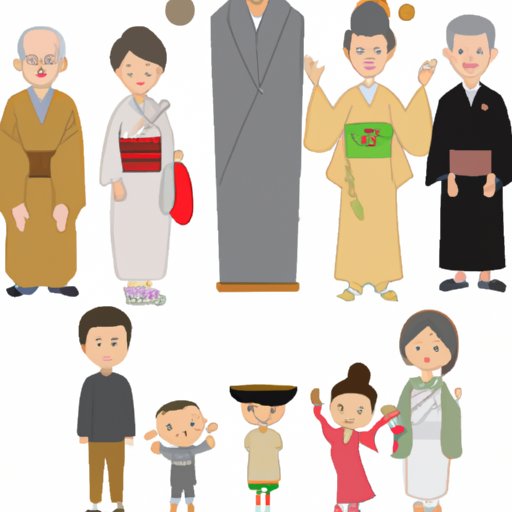Introduction
Collectivism is an important concept in sociology that refers to a group-oriented mentality where people prioritize group goals over individual interests. In this regard, collectivism can be seen as a contrast to individualism, which emphasizes personal autonomy and self-determination. To better understand the impact of collectivism in different cultures, it is important to look at examples from around the world. In this article, we will explore the collectivist nature of Japanese culture and examine how family and religion play a role in shaping social values. We will then compare individualism and collectivism to understand how these two concepts coexist in Japan.
Examining the Group-Orientation of Japanese Culture
In many ways, Japanese culture is highly group-oriented. This is evident in both the traditional family structure as well as the influence of Confucianism, which has had a profound effect on the values and beliefs of Japanese people.
Role of Family in Collectivism
The traditional family structure in Japan is an integral part of its collectivist culture. The family unit is seen as the primary source of identity and loyalty, with members expected to put the needs of the group ahead of their own. As such, there is a strong emphasis on cooperation and responsibility towards other family members. This extends to extended family as well, with members often living and working together in order to support one another.
Impact of Confucianism on Collectivism
Confucianism is a Chinese philosophical system that has had a significant impact on Japanese culture. This ideology promotes a strict hierarchical system with clear roles for each member of society. People are expected to adhere to their predetermined roles and abide by the norms of society. This sense of duty and loyalty to the group is a key element of collectivism and is evident in many aspects of Japanese life.

Exploring the Role of Family in Japanese Collectivism
Family plays an important role in Japanese collectivism. The traditional family structure is based on loyalty and mutual obligation, with members expected to put the needs of the group ahead of their own. This is especially true within the nuclear family, where parents are seen as authority figures who must be respected and obeyed. Children are taught to show deference to their elders and to strive for harmony within the family. This emphasis on cooperation and responsibility towards others is a key element of Japanese collectivism.

Influence of Family on Social Values
The traditional family structure in Japan has a direct impact on social values. For example, respect for elders is an important part of Japanese culture and is rooted in the belief that one’s parents and grandparents should be honored and respected. Similarly, loyalty to one’s family is seen as a virtue and is deeply ingrained in Japanese culture. This loyalty is not only directed towards family members, but also to one’s country and community. In this way, the traditional family structure helps to reinforce the collective mentality of Japanese culture.
Analyzing the Impact of Confucianism on Japan’s Collectivist Culture
Confucianism has had a profound influence on Japanese culture. This philosophy promotes a hierarchical system of social organization, with clear roles and expectations for each member of society. This sense of duty and loyalty to the group is a key element of collectivism and is evident in many aspects of Japanese life.
History of Confucianism in Japan
Confucianism was first introduced to Japan in the 6th century AD by Buddhist monks from China. Over time, it began to take root in Japanese society and eventually became a central part of the culture. Today, Confucianism is still an important force in Japan, influencing everything from education to politics.

Core Values of Confucianism
At its core, Confucianism is centered around five main values: respect, loyalty, filial piety, obedience, and honor. These values emphasize the importance of group harmony and cooperation, while also stressing the need to follow established rules and regulations. This focus on collective behavior is a key element of Japanese collectivism and can be seen in many aspects of daily life.

A Comparison of Individualism and Collectivism in Japan
Although Japan is generally seen as a collectivist culture, there is also a strong tradition of individualism. This is evident in the way that people express themselves and pursue their own interests. For example, many young people in Japan are highly independent and value their freedom and autonomy. At the same time, they are also expected to adhere to certain social norms and to show respect for their elders. This balance between individualism and collectivism is an important part of Japanese culture and helps to shape the values and beliefs of its people.
The Influence of Shintoism on Japan’s Collectivism
Shintoism is an ancient religion that has been practiced in Japan for centuries. Although it is not as prominent today as it once was, its influence can still be felt in many aspects of Japanese culture. Shintoism promotes a sense of harmony and unity with nature, as well as reverence for ancestors and spirits. These values are closely linked to collectivism and help to reinforce the idea of putting the needs of the group ahead of individual desires.
Conclusion
Japanese culture is deeply rooted in the concepts of collectivism and group-orientation. This can be seen in the traditional family structure as well as the influence of Confucianism and Shintoism. While individualism does exist in Japan, it is usually balanced with a strong sense of loyalty and responsibility towards the group. Understanding the importance of collectivism in Japan can help us to better appreciate the values and beliefs of its people.
(Note: Is this article not meeting your expectations? Do you have knowledge or insights to share? Unlock new opportunities and expand your reach by joining our authors team. Click Registration to join us and share your expertise with our readers.)
